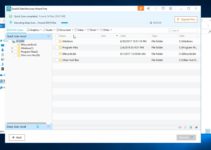USB drives and memory cards are very convenient and manufacturers continue improving these devices, ensuring that they offer more space and become more affordable, which is why many people rely on them for storing their files. However, if you depend only on these storage options to keep your data, you have been living dangerously. All it takes is a moment of distraction to make a mistake and accidentally deleting an important file from your storage device, would be incredibly frustrating – to say the least.
In many cases, the light at the end of the tunnel when you accidentally delete files is data recovery software and while there are many options available, the majority of programs are designed to retrieve data from system drives. That doesn’t mean that you cannot find tools to get back your lost files from mobile storage devices like memory cards and flash drives. In this article, we will check the best solutions available for these cases. Before we review the recovery tools that you can use to get back your data from mobile storage devices, we will take a look at some general tips that you need to consider.

Prevention is the best way to protect your data and one of the things that can help you to avoid further data loss or damage, is to set your mobile storage devices as read-only before using any recovery tools. This is easy with most SD cards as they have a write-protect switch, but for USB drives, things are more complicated since there is no option to manually mount the file systems as read-only on Windows. For Windows XP SP2 and above there is a Registry setting that sets all USB mass-storage devices into read-only mode. However, some recovery programs that are designed to be used with writable devices, may not work when the read-only mode is set.
Keep in mind that recovering lost files is a process that may take a long time, particularly if you are using a program that supports deep scanning. The speed and performance of the program depend in great part on your computer’s capacity since the scanning process requires comparing file signatures and dismissing false positives. Unless your computer is really fast, you will need to wait and be very patient while running a deep scan.
Something else that you need to consider is that while memory sticks and SD cards usually can be removed immediately without any issue, it is better to eject them using the Safely Unplug Hardware option as this reduces the risk of data loss. Although recovering data from mobile storage devices can be challenging even when using recovery software due to differences in formats or possible damage to the storage device, the programs in our list may be able to help you when there seems to be no hope to see your deleted files ever again.
Here are some of the options you can choose from when you need to retrieve files from an SD card, a USB drive, and other portable storage devices.
PhotoRec
PhotoRec is one of the most effective solutions to recover files from any mobile storage device, even if it has been formatted or has a partition and it doesn’t matter if it has been mounted with a drive letter or not. It also offers great compatibility since it works with a variety of operating systems including Mac OS X, Windows, and Linux. PhotoRec can detect and recover a large selection of files including documents, presentations, videos, and of course, photos.
While the interface is not exactly appealing or simple, it works well. Once you start running PhotoRec, you will see a list of available storage devices in the system including removable drives connected and hard drives. After selecting a device and partition, you can specify your search options and choose a location to save the files recovered. PhotoRec provides an estimated recovery time and it is possible to pause the process in case it is taking longer than expected. You will be able to resume it at a later stage.
PhotoRec is a good option for advanced users who need a powerful tool that adapts to different recovery scenarios. Even if the device you are trying to recover files from, has damaged partitions or there are issues with the directory information, PhotoRec is effective and allows you to add your own custom file types in case they are not listed in the program’s list of file signatures. The software is available for free, but you can support the project with a donation.
Recuva by CCleaner (Piriform)
Simplicity and efficiency are what Recuva offers through a fully-functional free version, but if you want to get technical support as well, you can upgrade for just $24.95. The tool is compatible with Windows XP and above and it makes files recovery easy by automating the process as much as possible. Once the tool is launched, you will be asked to provide information about the data that you need to restore and after your selection is complete, Recuva starts scanning in the background while you continue working on other tasks.

When it has finished scanning, the program offers a comprehensive report of the files found, including details about the file status and a preview for JPGs and other file types supported. It is possible to look for files as thumbnails, which is convenient if you need to find a specific image amongst several options. However, you will have to rename the files manually as the original file names are not recovered and they are all assigned random names.
What makes Recuva an appealing, hassle-free tool for recovering your files is that it has a very practical interface that guides you through the settings, while the tool takes care of most parts of the process. The fact that even the paid version is very affordable is another reason to choose Recuva as your data recovery solution.
Recover My Files
This file recovery software designed for Windows offers different options to retrieve multiple file types. There are three versions of the program to choose from: Standard, which costs $69.95, Professional for $99.95, and Technician, which is currently available for $349.95. The Standard version allows users to recover from FAT/NTFS partitions and the Professional and Technician versions have additional customization options and support for HFS and RAID. The Technician version also comes with dongle activation, which enables users to activate the software using USB hardware.
With Recover My Files, users can choose between recovering individual files and recovering files from an entire drive. The first method scans directories to look for evidence of deleted files while the second uses the deep scan to search through the whole file system and tries to rebuild lost partitions. You can customize the deep scan according to your needs. By default, it will look for documents, music, and photos, but you can use an advanced option for a meticulous scan that includes a wider selection of file types. If you know exactly what you are looking for, you can focus the scan on determining file types to speed up the process.
Although the price of Recover My Files is considerably higher than other options available, the program’s performance is quite satisfactory and it offers an efficient way to get your files back. While the deep scan mode can take a large amount of time, the results obtained are very impressive.
CardRecovery
This application is specifically designed to recover files from memory cards in cameras and it is only effective for JPG, RAW-format image files, and video/audio files in MP3, AVI, MPG, MOV, and WAV. CardRecovery will not work for any other file types, but it offers a great solution if you are looking to get back photos, music, or videos. This application is also very easy to use and it allows you to recover files following a few steps.
Unfortunately, there is no preview mode during the scan, which means that you have no option to confirm if the file you are looking for has been indeed found before the scan is completed. While it is possible to preview JPGs once the scan is finished, this option is not available for RAW-format files, meaning that it would be more convenient to recover everything and go through the results afterward.
CardRecovery is only suitable for devices that have a drive letter, meaning that it would not be a solution for cases in which the card’s partition information has been damaged. You can test CardRecovery by downloading a free trial version that will enable you to scan data and locate lost files, but in order to recover them, you will need to purchase the full version for $39.95 USD. CardRecovery will suit anyone whose main concern is to recover data from cameras and it offers a convenient price. It is available for Windows.
Remo Recover
Remo Recover is very similar to Recover My Files and it is also available in three paid editions that suit different recovery needs and there are versions compatible with Mac and Windows. You can choose the Basic version, which allows you to recover a missing or deleted file for $39 USD. If you need to recover lost or deleted media files including RAW format photos, you can opt for the Media edition for $49, and for recovery from lost partitions or reformatted drives, you can go for the Pro version for $99 USD. Mac users have the same options, but the prices are slightly higher.
All versions allow you to set your search settings according to the type of recovery you need, but there is no option to select a common file format, meaning that you will need to wait for the scan to complete before you can choose the files you actually want to retrieve. It is also possible to save recovery sessions and to resume them at a later stage if required.
Although the results presented by Remo Recover include a large number of false positives, the tool offers a reasonable price and good search speed. In order to improve the accuracy of the data retrieved, you will need to be very specific with the file types that you want to search, but overall, Remo is an efficient way to get back your lost files from a mobile storage device.




